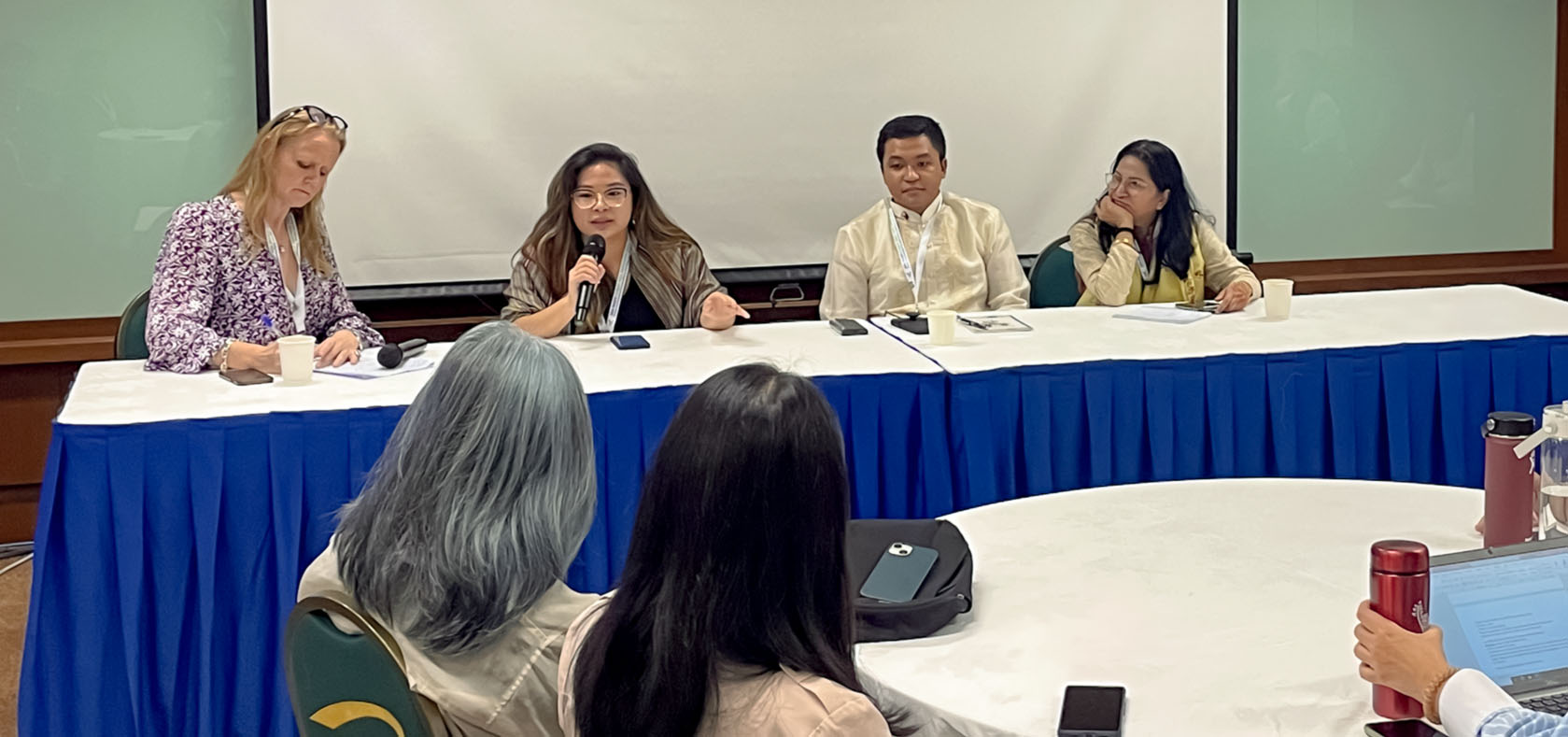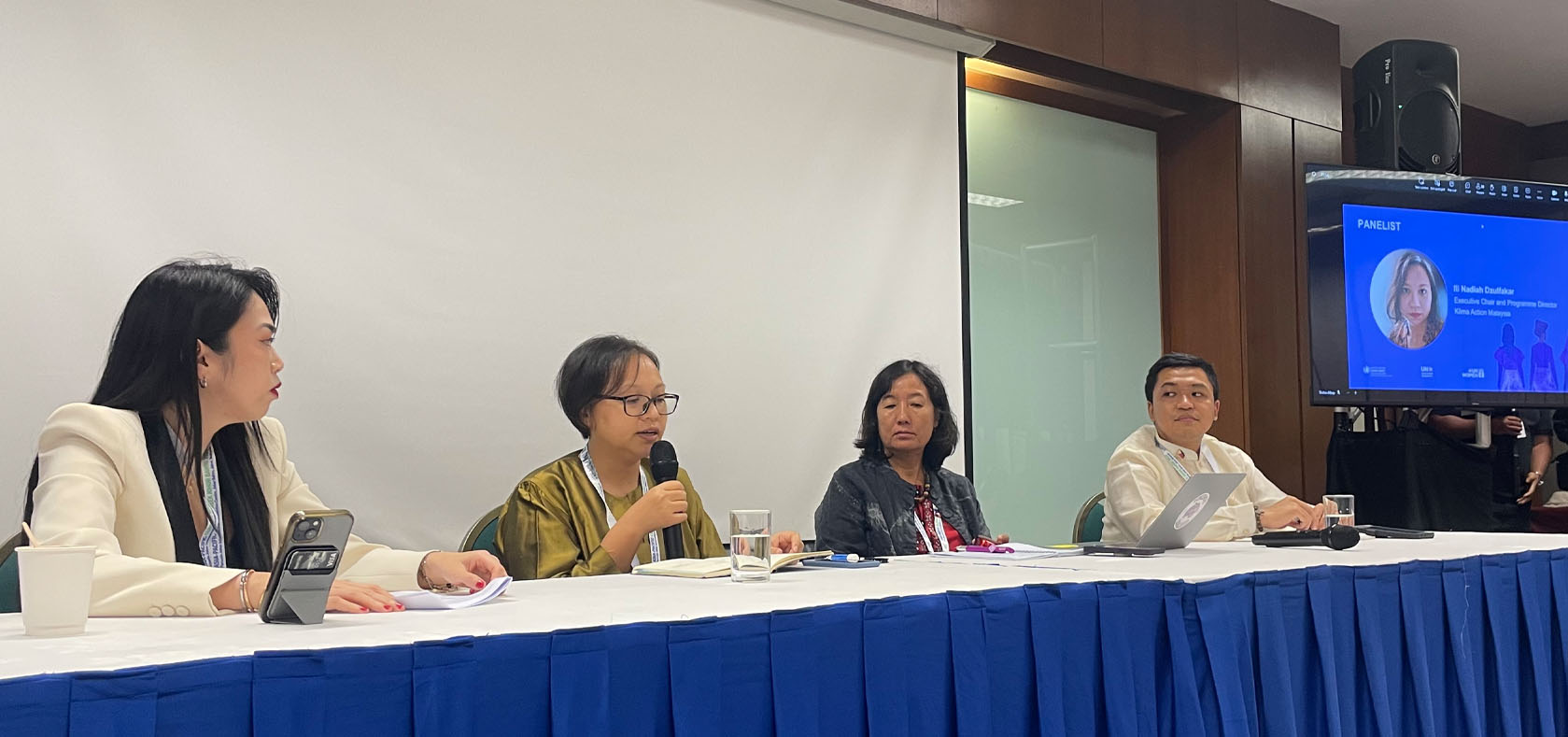Women’s rights and leadership in focus at the Asia-Pacific Climate Week 2023
Date:
Author: Trisha Albay

Johor Bahru, Malaysia — The energy transition must be just and grounded in human rights and gender equality. This was the key message at two side events co-organized by UN Women and the UN Environment Programme (UNEP) at the Asia-Pacific Climate Week (APCW) 2023 in Johor Bahru, Malaysia.
APCW 2023 provided a platform for policymakers, practitioners, businesses and civil society to exchange on climate solutions, barriers to overcome and opportunities realized in the Asia-Pacific region. Hosted by the Government of Malaysia in the city of Johor Bahru, APCW 2023 took place from 13-17 November 2023.
To address climate change, countries around the world have committed to achieving “net zero” in the first half of this century, as outlined in the Paris Agreement. Net zero means balancing greenhouse gas emissions with their removal, primarily through cutting down emissions to as close to zero as possible. One way to achieve this is to transition from fossil fuels to renewable energy.
The first side event, co-organized with UN Climate Change (UNFCCC), explored the challenges women and marginalized groups face in accessing decentralized renewable energy and ways to ensure they are not left behind.
Tove Goldmann, First Secretary, Regional Development Cooperation Section at the Embassy of Sweden in Bangkok, opened the session by highlighting the importance of multistakeholder collaboration for a just energy transition. Ms Goldmann shared about EmPower: Women for Climate-Resilient Societies, a joint UN Women and UNEP programme that works with governments, communities, women entrepreneurs, civil society, the private sector and other partners with support from the Governments of Sweden and New Zealand.
“Our support should not end after women-led cooperatives and enterprises have access to renewable energy. They cannot fully harness its benefits without capacity building support in running and expanding their businesses,” said panelist Toni Madulid, Executive Director at Reboot Philippines, a youth-led organization advocating for a just energy transition.
Joe Mari Francisco, the alternate Gender and Climate Change Focal Point at the Climate Change Commission of the Philippines, raised that there is sometimes a gap between the support provided by development partners and the support needed by communities. Mr Francisco shared the Philippines’ initiatives to bridge this gap, such as local government units conducting discussions with communities, including rural women.
The second side event, co-organized with UN Human Rights (OHCHR), discussed the challenges and opportunities to strengthen women’s land rights as a cornerstone of climate change solutions.
Despite being the traditional custodians of land, women tend to have less access to resources, protection, decision-making, and leadership, affecting their ability to adapt to the impacts of climate change.
Ili Nadiah Dzulfakar, Chair and Programme Director at Klima Action Malaysia highlighted that women’s participation in sustainable land management is crucial to address climate change. Yet, they continue to face security risks when engaging in negotiations and decision-making spaces. Ms Dzulfakar noted that environmental and social safeguards need to be in place to ensure respect for human rights, especially Indigenous Peoples’ rights and those of local communities and environmental human rights defenders.
Pasang Dolma Sherpa, Executive Director at the Center for Indigenous Peoples' Research and Development (CIPRED), shed light on the importance of Indigenous Peoples’ traditional knowledge, cultural practices and skills on climate change resilience as well as sustainable management of the natural resources, forest, ecosystem and biodiversity.

Insights from the event will support the first global stocktake of global climate action under the Paris Agreement at the UN Climate Change Conference (COP28) in Dubai, United Arab Emirates.
For more information, please contact:
Bindu Bhandari
Programme Analyst
UN Women Regional Office for Asia and the Pacific
e: [ Click to reveal ]
This initiative is supported by the Governments of Germany, New Zealand and Sweden through these programmes:
The EmPower: Women for Climate-Resilient Societies Programme is jointly implemented by UN Women and UNEP with support from the Governments of Sweden and New Zealand.
The Enhancing Women’s Access to Justice in Asia and the Pacific Project is jointly implemented by UN Women and OHCHR with support from the Government of Sweden.
The Strengthening Capacity of Regional Actors to Promote Human Rights, Accountability, Democratic Space and Gender in the Asia-Pacific Region is implemented by OHCHR with support from the Government of Sweden.
The Advancing the Human Right to a Healthy Environment Project is implemented by OHCHR with support from the Government of Germany.